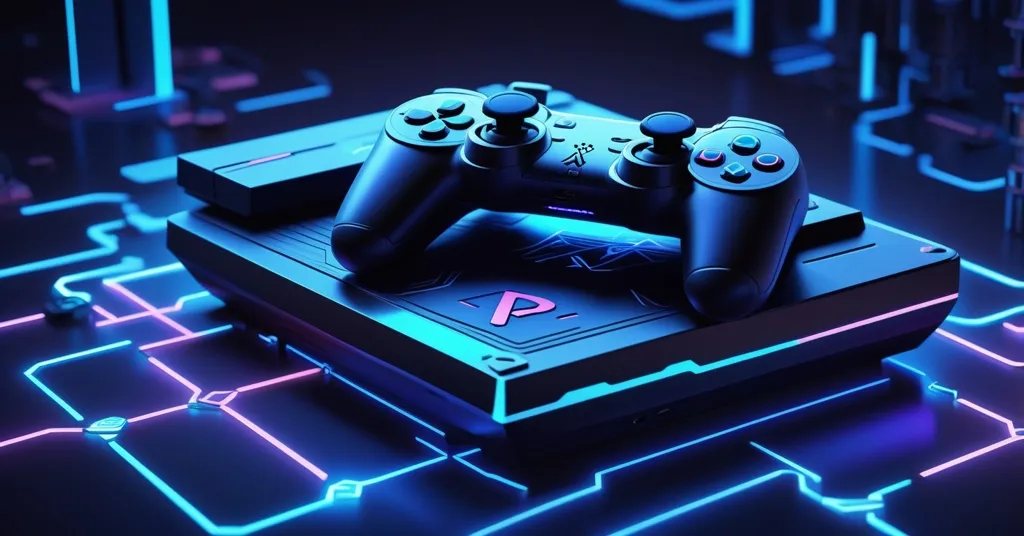Sony’s Profit Soars with Gaming Success: Is Blockchain the Next PlayStation Frontier?

Sony’s Profit Surge Meets Gaming Glory: A Blockchain Revolution on the Horizon?
Sony Group Corp. has just upped the ante, raising its annual operating profit forecast by 4% to ¥1.33 trillion (about $9.01 billion), powered by a red-hot gaming division and a dodged bullet on U.S. tariffs. But beyond the flashy numbers, there’s a bigger play at hand—one that could intersect with the decentralized tech we’re obsessed with here. Let’s unpack Sony’s dominance and ask: could blockchain be the next level-up for this tech titan?
- Profit Jump: Sony’s annual forecast climbs 4% to ¥1.33 trillion, driven by gaming success.
- Gaming Goldmine: PlayStation 5 sales and new titles push gaming profits to ¥148 billion, up over 100%.
- Tariff Dodge: U.S. tariff hit slashed from ¥100 billion to ¥70 billion, but risks remain.
Gaming Powerhouse Unleashed
Sony’s latest earnings for the April-June quarter are a knockout, with operating profit soaring 36.5% year-on-year to ¥340 billion—blowing past analyst guesses of ¥288 billion. For the uninitiated, operating profit is the cash a company pulls in from its core business after covering daily expenses, and Sony’s raking it in. The gaming division is the heavyweight champ here, with profits doubling to ¥148 billion. That’s largely thanks to the PlayStation 5 sales surge, which sold 2.5 million units in Q1 alone, a 4% bump from last year. Blockbuster releases like Death Stranding 2: On The Beach (launched in June) and the upcoming Ghost of Yotei (slated for October) are keeping gamers hooked, while digital sales via the PlayStation Network and third-party titles add fuel to the fire. High-fidelity gaming—think jaw-dropping graphics and immersive worlds—is Sony’s bread and butter, and they’re owning it.
But here’s the kicker for us tech rebels: Sony’s digital ecosystem, where users buy games and subscriptions through PlayStation Network, is a walled garden. Once you’re in, good luck leaving—your purchases are locked to Sony’s platform. This creates incredible revenue streams (network services are a huge chunk of that ¥148 billion), but it’s also a glaring centralization problem. Could decentralized tech like blockchain break this chokehold and give gamers true ownership? More on that soon.
Navigating Tariff Troubles
Sony’s not out of the woods yet, despite the celebratory numbers. Global trade tensions, especially with the U.S., are a lingering headache. Initially expecting a ¥100 billion hit from U.S. tariffs—taxes slapped on imported goods that jack up costs for companies like Sony—the impact was revised down to ¥70 billion as of August 1. A recent Japan-U.S. trade agreement helped soften the blow, but Chief Financial Officer Lin Tao isn’t ready to relax.
“There are still some fluid aspects, such as product-specific tariffs,”
Tao warned during an earnings briefing. Translation? Sony’s dodging tariff bullets for now, but the trade war Wild West ain’t over. Rumors of secondary tariffs, like a potential 100% levy on non-U.S. computer chips, could spike hardware costs for the PlayStation 5 and other gear. If those costs trickle down to consumers, expect sticker shock in price-sensitive markets. And let’s not forget—higher hardware prices could slow adoption of next-gen tech, including any blockchain-integrated gaming rigs or VR setups Sony might be cooking up for the metaverse. Trade drama isn’t just a balance sheet issue; it’s a potential roadblock to innovation, as seen in recent U.S. tariff updates.
Blockchain: The Next PlayStation Frontier?
Now, let’s talk about the juicy stuff—Sony’s flirtation with blockchain and decentralized tech. This isn’t pure speculation; Sony has filed patents as far back as 2021 for NFT (non-fungible token) integration in gaming. For the newbies, NFTs are unique digital assets verified on a blockchain—think of them as a digital deed for in-game items like skins, weapons, or even entire game copies. Imagine buying a rare sword in Ghost of Yotei and actually owning it, able to trade or sell it across platforms without Sony’s permission. That’s the promise of decentralization, and it directly challenges the current lock-in model where Sony controls your digital stash, a topic explored in depth in Sony’s NFT patent analysis.
Sony’s dominance in digital sales and microtransactions—those small in-game purchases that add up to big bucks—makes blockchain a no-brainer. A decentralized gaming ecosystem could secure these transactions, cut out middlemen, and maybe even integrate cryptocurrency payments like Bitcoin for PlayStation Network buys. Picture this: topping up your account with BTC instead of a credit card, bypassing traditional payment systems. It’s not just about convenience; it’s a middle finger to centralized financial gatekeepers, aligning perfectly with our push for freedom and disruption, and something already being considered with options like crypto payments for PlayStation.
But let’s play devil’s advocate. Blockchain in gaming isn’t a guaranteed win. Scalability issues—blockchains struggling to handle mass transactions—could tank the user experience. And gamers aren’t always sold on NFTs; just look at the backlash Ubisoft faced when it tried dipping into this space. Many saw it as a cash grab rather than a value-add. If Sony jumps in without a clear, player-first approach, they risk alienating their loyal base. Plus, regulatory uncertainty around crypto and NFTs could throw a wrench in any plans. Still, if done right, Sony could redefine gaming ownership and position itself as a leader in the decentralized future, as discussed in community debates on PlayStation 5 blockchain integration. We’re watching this space like hawks.
Competitive Threats: PCs and Beyond
Back to the gaming arena, Sony’s not untouchable, even with its high-fidelity crown. Serkan Toto of Kantan Games cuts through the noise with a sharp take:
“Sony is further cementing its dominance in high fidelity gaming. In my view, Sony is now competing with the PC more than the Xbox.”
He’s got a point. While Microsoft’s Xbox is still in the ring, PC platforms—with their raw power, customization, and cross-platform flexibility—are the real contender. Gamers craving top-tier performance are increasingly eyeing PCs over consoles, especially as titles go multi-platform. Sony’s ecosystem keeps users sticky, but complacency could cost them if they don’t keep innovating, a concern echoed in gaming market discussions.
Then there’s the wildcard: the delay of Grand Theft Auto VI to 2026. This gap could let competitors like Nintendo, with its rumored Switch 2, snag casual gamers Sony often overlooks. But let’s not overhype this—Sony and Xbox’s duopoly, built on brand loyalty and digital libraries, is a fortress. New entrants like Valve’s Steam Deck face an uphill battle without a pricing or innovation edge. Still, Sony can’t sleep on these threats. Pushing boundaries—maybe with blockchain or VR tied to metaverse plays—could keep them ahead of the curve.
Strategic Moves and Diversification
Sony’s not just a gaming juggernaut; it’s a diversified beast spanning music, movies, sensors, and more. This spread cushions them against blows in any one area, whether it’s tariffs or gaming flops. As part of this chess game, they’re slashing their stake in their financial services unit to under 20%, listing it on the Tokyo Stock Exchange on September 29. This isn’t just housekeeping—it’s streamlining to double down on high-growth zones like gaming and digital content. Investors are eating it up, with Sony’s stock spiking 4% post-earnings and up 15% year-to-date, a trend highlighted in Sony’s profit forecast boost. But let’s be real: divestitures don’t always scream “consumer first.” Is this truly about focus, or just padding profits? We’re skeptical, and you should be too.
Key Takeaways and Burning Questions
- What’s behind Sony’s profit forecast boost?
A killer combo of PlayStation 5 sales (2.5 million units in Q1), hit games like Death Stranding 2, and digital revenue from PlayStation Network, plus a lower-than-expected tariff hit. - Are U.S. tariffs still a risk for Sony?
Hell yes. Even with the impact cut to ¥70 billion, fluid trade policies and potential chip tariffs could inflate hardware costs, possibly hitting consumers and slowing tech adoption. - How does Sony’s gaming dominance tie to decentralization?
Their centralized ecosystem locks in users, but blockchain could flip that, offering true ownership of digital assets and aligning with our push for freedom in tech and finance. - Could Sony integrate Bitcoin or crypto payments?
It’s plausible. With digital sales booming, accepting Bitcoin for PlayStation Network purchases could disrupt traditional payment systems and boost crypto’s mainstream cred. - What’s the biggest threat to Sony’s gaming throne?
PC platforms, with their power and versatility, are the real rival over Xbox. Delays like Grand Theft Auto VI might also give Nintendo a window, though Sony’s fortress is tough to crack.
What’s Next for Sony and Crypto?
Sony’s riding high, balancing gaming glory with strategic pivots amid trade uncertainties. From doubling down on PlayStation to shedding non-core assets, they’re playing a calculated long game. Yet, the specter of tariffs and PC competition looms large. For us champions of decentralization, Sony’s blockchain patents and digital dominance hint at a potential game-changer. If they lean into NFTs or crypto payments, they could tie their tech empire to the future of freedom and finance, a possibility further explored in discussions on NFTs in the gaming ecosystem and broader insights into Sony’s tech ventures. But will they take the leap, or stick to their walled garden? Keep your eyes peeled—this giant’s got more surprises up its sleeve.



